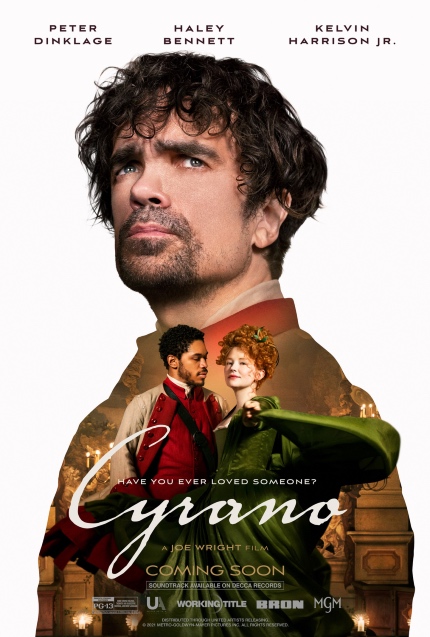Review: In CYRANO, Peter Dinklage Shines

Despite a prolific career stretching back almost two decades, the British-born Joe Wright (Anna Karenina, Hanna, Atonement) rarely comes up in conversations about generational best filmmakers.
At minimum, Wright should be, but given his predilection for period adaptations and not contemporary ones, he’s seen, if not a second-rate talent, then a second-tier one.
It’s not particularly fair to Wright or the oeuvre he’s carefully crafted over close to 20 years, beginning with the visually sumptuous adaptation of Jane Austen’s Pride & Prejudice in 2005, turning the then little-known Keira Knightly into a certifiable movie star practically overnight, through Atonement two years later (Knightly again, a 13-year-old future Academy Award nominee in Saoirse Ronan, and James McEvoy), and skipping a few films and years, Darkest Hour (an Oscar winner for Gary Oldman as a wartime Winston Churchill).
Wright’s latest film, Cyrano, a musical adaptation of Edmond Rostand’s perennially popular 1897 play (itself oft-adapted in various and diverse media), isn’t likely to elevate Wright’s status in the eyes of the usual film-oriented gatekeepers, but judged on its own merits, it’s a thoroughly thrilling, sometimes enthralling, visually stunning piece of pop art, relying on a combination of Wright’s impeccable craftsmanship, eye-catching, period-specific detail, and a trio of central performances (Peter Dinklage, Haley Bennett, and Kelvin Harrison Jr.) that handle the multiple, overlapping demands of their roles with just as much dedication, skill, and talent as Wright himself.
Shot on location in a sun-dappled, open-air Sicily and set, like Rostand’s play, Cyrano de Bergerac, in the late 17th century, Cyrano swaps out the title character’s oversized proboscis for Dinklage’s diminutive stature, but otherwise keeps Cyrano’s verbal dexterity and unmatched swordsmanship. Cyrano can disarm friend and foe with either a turn of phrase or a quick thrust of his sword, but for all his verbal and physical skills, Cyrano practically recedes into the background when his long-time, unrequited love, Roxanne (Bennett), makes an appearance into his life. For all his romantic inclinations, Cyrano can’t see himself as an object of Roxanne's affection and acts (and reacts) accordingly, perpetually avoiding the possibility, however dim or distant, of a romantic relationship with Roxanne.
When, pace Rostand’s play and every intervening adaptation, the third side of Cyrano and Roxane’s romantic triangle, Christian de Neuvillette (Kelvin Harrison Jr.), a young soldier and Cyrano’s friend, enters from stage left, Cyrano doesn’t exit stage right, leaving the two young, potential lovers to find each other. Instead, he volunteers to act as Christian’s figurative if not literal voice, writing all manner of flowery prose for the verbally challenged Christian to romance Roxanne.
Between Cyrano’s high-minded, abstract prose and Christian’s conformity-embracing appearance, Roxanne believes she’s found her ideal romantic partner. Really, though, she’s found two halves of one possible partner.
It’s certainly a deceptive, agency-violating ruse with the potential to alienate audiences, but in Rostand’s play and Wright’s adaptation, working from Erica Schmidt’s screenplay (itself an adaptation specifically written for Dinklage, Schmidt’s husband), Cyrano’s self-sacrificing nobility, helping Christian obtain the romantic relationship he can’t achieve for himself, broadly turns him into a sympathetic, ultimately root-worthy character. It helps, of course, that Cyrano’s height (or lack thereof), used by his opponents to ridicule, demean, and dismiss him, automatically makes Cyrano the kind of underdog audiences will cheer without irony, hesitation, or reservation.
Schmidt and Wright modestly tweak Cyrano de Bergerac’s chief antagonist, the duplicitous, Roxanne-pursuing De Guiche (Ben Mendelsohn), into an outright, hissable villain of nefarious intent and purpose. Played with scenery-chewing, ham-handed gusto by Mendelsohn, a specialist in this kind of role, De Guiche is exactly the kind of character audiences will cheer vociferously against anytime he’s onscreen. He also functions narratively as a diversion: While the audience is caught up rooting against De Guiche and his plans for Roxanne, it makes it significantly easier to overlook Cyrano’s questionable decision-making vis-a-vis Roxanne or the malleable Christian’s willingness to go along with Cyrano’s deception to obtain Roxanne’s affection.
Wright surrounds Dinklage, Bennett, and Harrison Jr. with visuals so strong (e..g., production design, costumes, cinematography) that they would threaten to overwhelm lesser actors. Thankfully, Wright instinctively understands that all the showmanship in the world might impress audiences superficially, but otherwise leave them cold and ultimately, disengaged and possibly even bored.
That Wright avoids letting Cyrano devolve into a showcase of his technical wizardry is a testament to his underappreciated skill as an actor-centered director. Wright recognizes that the quality of a performance s matters, if no more than, everything around that performance. And with Cyrano, he helps his central actors deliver career-best or near career-best performances.
Cyrano opens in movie theaters today (Friday, February 25).Visit the official site for locations and showtimes.
Cyrano
Director(s)
- Joe Wright
Writer(s)
- Edmond Rostand
- Erica Schmidt
Cast
- Peter Dinklage
- Haley Bennett
- Kelvin Harrison Jr.







